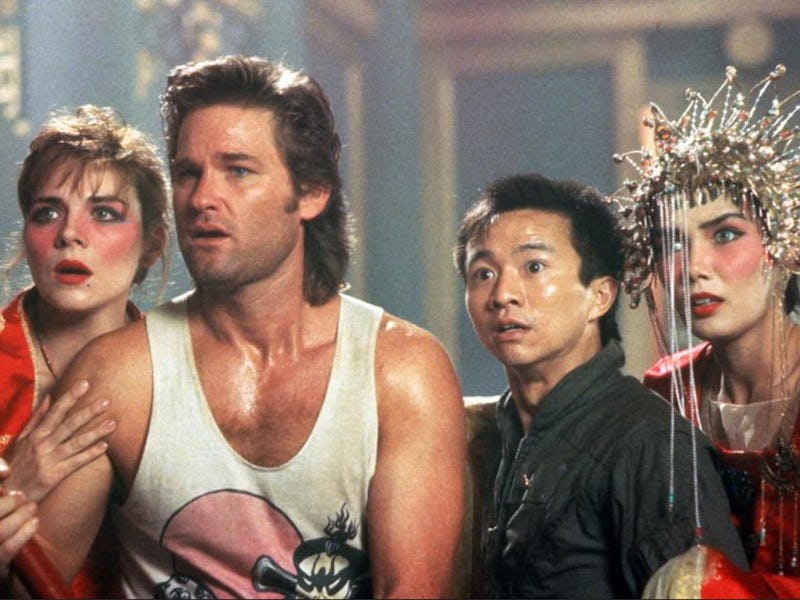Here's What Dwayne Johnson Should Avoid in the 'Big Trouble in Little China' Remake
Less offensive stereotypes, more adventure comedy.

Dwayne “The Rock” Johnson is planning to produce and star in a remake of director John Carpenter’s cult classic Big Trouble in Little China. Johnson, who has called the movie one of his favorites, will step into the role of Jack Burton, the buffoonish truck driver first played by Kurt Russell, who finds himself in over his head battling mystical forces in San Francisco’s Chinatown. Cringes ensue.
Why anyone with any options whatsoever would choose to remake a piece of dated camp such as Big Trouble in Little China has instantly become one of the world’s modern mysteries, on par with why an NFL team could still be called the Redskins. When the adventure comedy came out in 1986, its appropriation of Asian culture may have seemed funnier than it does a generation later. Watch it today and its flagrant stereotyping becomes a tad more, um, problematic, to put it gently, or jaw-droppingly offensive, to put it more accurately. Here are a few things Johnson should cut from his version:
1. Names Played for Laughs
Wang is a perfectly legitimate and common Chinese surname, and yes, it’s also slang for penis. Laughing at this probably shouldn’t be funny after, oh I don’t know, the fourth grade. The original movie had a tendency to use this high-on-airplane-glue level of punning to mine cheap yuks out of Chinese culture — most notably making the character Egg Shen’s tourist company called “Egg Foo Yong Tours.” This is cultural sewage. Let’s hope it stays buried.
2. The Three Storms
Try to at least have the villains in the movie actually mean something instead of clumsily defined by their exaggerated stereotypes of conical hats and loose orientalist association with mysticism. Yes, I will allow that the thunder guy does some awesome moves and ends up exploding in a gnarly scene at the end of the movie (whoops, spoilers), and the lightning guy was even the inspiration for Raiden in Mortal Kombat. But lets put some legitimate thought into them in the new one instead of having them just fly around doing karate.
3. Inexplicable Martial Arts
In Big Trouble in Little China, all Asians can do martial arts no matter if they’re the owner of a local restaurant or an old man who runs a tourist van company. Part of this plays into the escapist themes of the movie, and to be honest it’s pretty great seeing Wang Chi basically own everybody at the end, but it’s probably a stretch to suggest that any Asian person walking down the street can just start flipping around and doing kung-fu. Simply add some explanation in there about who’s doing the martial arts and why, and voila, we won’t be watching a reductive, racist cartoon.
4. Inexplicable Mysticism
The original movie holds that everyone in San Francisco’s Chinatown is part of some kind of some centuries-old battle between Chinese tribes, and that this kind of epic mythological battle is known to every Asian person. You could call it a narrative device to explain to the audience what exactly is going on, or you could call it a lazy way of glossing over Chinese history rife with actual mythology. This is how you make an offensive movie: Sketch a country of more than a billion people as a single, flimsy caricature.
5. Lo Pan
David Lo Pan is probably the single most racist thing about the original movie. Blame it on actor James Hong’s woeful Fu Manchu/Charlie Chan-esque performance and John Carpenter’s decision to make Lo Pan into the most egregious caricature of an Asian person in modern cinema. It doesn’t matter if he’s a 2,000 year-old sorcerer. He’s still mortifying.
6. White People in Yellowface
Don’t do it, plain and simple. See: Kim Cattrall, pictured.
The racial weirdness in Big Trouble in Little China is so deeply ingrained in its DNA that a non-reductive, non-racist, non-stereotypical remake seems oxymoronic. Then again, it’s not 1986 any longer. Foreign markets for domestic film releases are relatively much larger — China’s not least among them — and there’s a chance the redux won’t be a steaming mess. How Johnson accomplishes that, if at all, will be at least as entertaining to see as the movie itself.